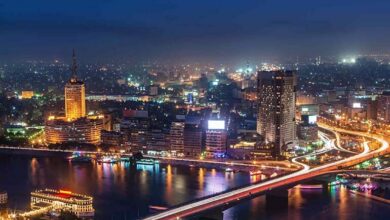Despite a court order issued by the supreme administrative court on 27 July to reopen all the streets around the US and British embassies in the Garden City neighborhood of Cairo, military officers guarding the area, store owners and residents believe the order will not be carried out anytime soon.
The streets around the embassies, especially the main thoroughfare, Amrika al-Latineya Street, have been shut off since the US and British-led invasion of Iraq in 2003. Protests in nearby Tahrir Square at the time prompted then-Interior Minister Habib al-Adly to shut down the 12 entry points around the embassies.
The closure has remained in place since then, and the main street that the two embassies overlook is completely barricaded from both ends. The other side streets are manned and barricaded as well. Police forces guarded the area until 25 January, but since then, military forces have made up the main presence, with a token number of policemen.
A military officer manning one of the entry points said that the military was not involved with the decision to insert or remove the barricades and that there had been no command to remove them. He added that the US embassy put them in place, and therefore should be in charge of removing them.
The US Embassy spokesperson told Al-Masry Al-Youm that all queries about the court order should be referred to the Egyptian government. The military officer on guard reiterated this position, saying the court order was issued to the Interior Ministry and the government, so it was up to them to implement it. Until that happens, nothing will change.
A plainclothed policeman in the area, who would only state that he was from the Interior Ministry – though he did not say no when asked if he was with its national security branch – followed this reporter to see what he was investigating and eventually told him that reporting on the street was not possible without a permit.
The military officer mentioned that residents were happy with the security presence in light of threats from thugs after the revolution, and that the barricades would probably not be removed because of the protests happening nearby in Tahrir.
“We could remove them, and then if something happens here we’d have to come back and close it again,” he said.
But residents of the neighboring streets did not agree. They have long complained about the stifling security measures that have negatively impacted their lives, and have not felt that the enhanced security has been an adequate trade-off for what they have had to go through every day for the past eight years.
Mervat Abdel Rahman Mahmoud, a long-time resident of Amrika al-Latineya Street, told Al-Masry Al-Youm that residents have had to contend with closure of the street even before 2003, when the US Embassy would host parties, for example.
She doubted that the court order would be implemented, especially in light of the recent Friday protest in Tahrir and the current situation in Egypt. On Fridays there is only point that serves as an entry and exit for the area.
“It’s been more difficult after the revolution. We only have one entry with our car; they see our ID, search the car, and film us as we go in,” she said.
Mahmoud has to come down to the checkpoints to pick up anyone coming to visit her and has complained that even though military police officers are polite, they will often search her car while smoking, which she finds objectionable.
“The sight of all the tanks and the soldiers is a little worrying,” she said. “The area was already secure before, so they can’t say it’s a security issue.”
The court decreed that the barricades be removed because they were illegal and unconstitutional. Furthermore, the court cited the street closures as examples of the state relinquishing its sovereignty. It ordered the Interior Ministry and Cairo Governorate to reopen all the routes around the two embassies.
Many nearby shop owners have sued the interior ministry, national government and US embassy for closing the roads; their cases that have been in the courts for over half a decade now. They are seeking compensation for the losses incurred since the closures.
Araby Abdel Hamid of a pharmacy store across the road from the entrance to the US Consular Services Section told Al-Masry Al-Youm that his loss of business since the closure of the roads has been immense, and that even if the roads were finally opened and the barricades removed, residents would still need to be compensated for their losses over the past eight years.
Abdel Nabi Abdel Hamid Hassan, owner of a nearby grocery store, shut down his business for six years because of the street closure. He did not believe that the barricades would be removed.
“No one has said anything, no one has told us anything, the barriers are still here and nothing has changed,” he said.
Mahmoud Emad, who works in La Poire delicatessen on the road, did not expect the barricades to be removed either, due to the continuous protests being held in the downtown area. His colleague, Amr Ali, said that the court order was a decision meant to calm residents and would not actually be carried out.
“For me to walk down the street in my country, and be asked for my ID to enter the street where I work, is like I’m visiting a foreign country, like the US or the UK,” he said.




